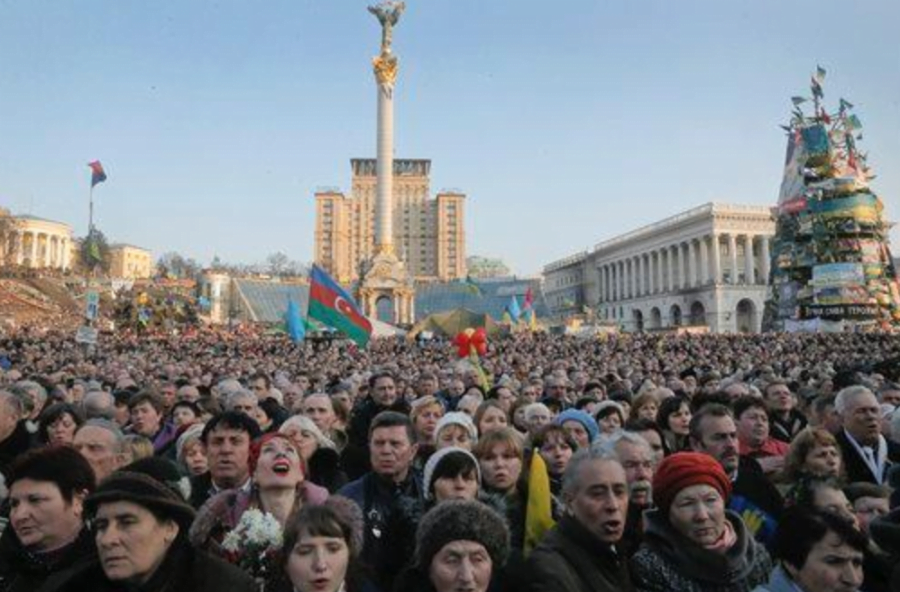Born in the United States, Julian Hayda is the grandson of four Ukrainian citizens who left the country after World War II. Even though he isn’t an immigrant, he didn’t speak English until he was 5 years old and maintained a thick accent until high school. He’s a passionate U.S. citizen, but still a Ukrainian at heart.
This made his first visit to the country a truly special experience. He remembers his 17-year-old self watching the plane descend and seeing everything he knew transformed into reality.
“You look out the window and you see this earth that I’ve literally been singing songs about, reading poems about, looking at paintings of-that had been my whole life, and I was there for the first time,” he said.
But by the time his next visit came around, Ukraine would be an entirely different country, one consumed by a struggle for identity and a fight against a broken government.
Protests have been rampant in Ukraine since November, when President Viktor Yanukovychrefused to sign a deal with the European Union and instead opted for stronger ties with Russia. The decision created a wave of anger that swept through the anti-Russian community in Ukraine, and protesters took to the streets to express disdain for the unchecked corruption in their government.
After hearing about the protests, Hayda decided around Dec. 1 that he had no excuse not to be there. Plus, Ukraine was the reason Hayda wanted to pursue film production, and he felt that visiting would be a “golden opportunity” to achieve his passions.
“I’d originally wanted to be a history major, but my family discouraged me and said I’d never get to do anything with that, so I figured the best way to tell stories, tell the history of Ukraine is by film,” he said.
Through this thinking, Hayda helped found the Euromaidan Journalist Collective, a group of journalism students from across the U.S.The organization visited Kiev, Ukraine – the heart of the unrest – in December to collect footage, talk to protesters, and most importantly, tell the country’s story. They arrived amid the government’s second attempt to quell the protests, which included police crackdowns.
However, what Hayda remembers most clearly is the resilience of the protesters. He saw one group among the chaos that refused to move for a dump truck, even if it meant being run over and possibly killed. According to Hayda, there’s a line in the Ukrainian national anthem that goes, “We will lie down our souls and our bodies for our freedom,” and in that moment, he realized how powerful those words could be.
“I’ve sung the Ukrainian national anthem ever since I was a toddler, but you never think twice until you stand there and you hear people sing it and they’re facing basically imminent death and meaning it,” he said.
After weeks of violence similar to what Hayda witnessed in December, Yanukovych and the protesters signed a deal Feb. 21 that called for the president’s removal, as well as early elections in May.
However, what seemed like a solution has since faded into the background. Tensions escalated last week when Russian President Vladimir Putin received permission from his Parliament to deploy military forces to Crimea, a pro-Russian region of the divided country. Now, Russia is maintaining its occupation, and world leaders are scrambling over the next step.
Crimea also plans to hold a secession referendum March 16, and if voters decide to separate from Ukraine, it could drastically change the tone of the situation.
Meanwhile, Hayda will soon be returning to Ukraine with his family. The trip was planned in July and wasn’t intended to be such a risky maneuver, but since the airline wouldn’t refund their trip, Hayda, his mother and three younger brothers are still committed.
“So we’re all going to a potential warzone,” he said.
Hayda doesn’t want to speculate too much about the nation’s future, but he says Ukrainian citizens are “hopeful, yet worried” and believes Ukraine will remain a sovereign nation when all is said and done.
“Putin and Yanukovych have inadvertently done more to unite Ukrainians than Ukrainians have in a hundred years, and now Putin is looking at 45 million people literally willing to die before giving up their country,” he said. “He’s delusional if he thinks he’ll win.”


